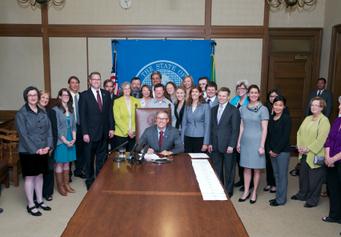Dear Neighbors,
Our top budget leaders are in Olympia this week trying to reach an agreement on the budget while most of us have returned home and are reconnecting with family and friends, working hard to respond to all of our constituents’ emails and calls from session, and for many us, attend to a second career.
Once budget writers reach agreement on most outstanding issues, the rest of the lawmakers will return to finish work on the 2013-15 operating budget, capital budget, and any other issues that can’t wait until next January.
While the media usually focuses on the things that legislators disagree on, it’s worth noting that Governor Inslee is in the midst of signing hundreds of bills that passed both the House and the Senate.
Bill signing ceremony for SHB 1341
 It was thrilling to attend the bill signing for SHB 1341, my bill that allows persons wrongly convicted and incarcerated to bring a civil suit against the state for compensation! Governor Inslee signed the bill into law on May 8th.
It was thrilling to attend the bill signing for SHB 1341, my bill that allows persons wrongly convicted and incarcerated to bring a civil suit against the state for compensation! Governor Inslee signed the bill into law on May 8th.
You can read more about the bill and see another photo of the bill signing here.
I’m pleased that the Governor will be signing my sixth and final bill into law next Tuesday which is the final day of bill signings. He will be signing HB 1525 to improve adoptees’ access to their original birth certificates.
Educating for the global economy
Gov. Inslee has been signing hundreds of bills passed by the Legislature. Typically, a bill-signing is a modest ceremony in his office with the sponsor and a few interested observers. But one bill signed into law this week prompted a much grander event. Students, teachers, and a top-ranking Microsoft exec gathered at Rainier Beach High School in Seattle, reflecting the commitment of the governor and many legislators to preparing our kids to compete in the emerging global economy of the 21st century.
 The measure – House Bill 1472, encourages ambitious high school students to enroll in high-level computer-science courses by making a simple change to state graduation policy. To earn a diploma, students must successfully complete a certain number of courses in specified subjects – and thanks to this bill, students can now count an Advanced Placement computer-science course toward their math or science graduation requirement.
The measure – House Bill 1472, encourages ambitious high school students to enroll in high-level computer-science courses by making a simple change to state graduation policy. To earn a diploma, students must successfully complete a certain number of courses in specified subjects – and thanks to this bill, students can now count an Advanced Placement computer-science course toward their math or science graduation requirement.
“We have some of the most innovative IT and computer businesses in the world right in our backyard, but too many of the jobs they’re hiring for are going to students and workers from other states and other countries,” Gov. Inslee said at the signing ceremony. “If we can encourage more of our students to try their hand at computer science in high school, we can open their world to so many amazing careers.”
And Brad Smith, executive vice president and general counsel at Microsoft, said, “This new law represents an important step forward for our kids and for the technology competitiveness of Washington state. By counting computer science classes towards high school distribution requirements, we’ll better help our own kids master the skills that will be vital to fill the jobs of tomorrow.”
Meaningful school reforms
We have many outstanding schools in our state but unfortunately we do have a small number that are struggling.
Only adequate funding combined with a sustained effort to implement meaningful reforms will give students the education they need, and taxpayers the value and accountability they deserve. To that end, a major piece of education reform recently signed into law by Gov. Inslee could be the most significant in years. It’s designed to identify Washington’s failing schools and put them on a path to excellence.
 The new law directs Superintendent of Public Instruction Randy Dorn and his staff to develop a process to determine which public schools fall into the lowest-performing category, and to write clear, workable guidelines to help them improve. The Legislature will provide funds to help these schools, if needed, and the schools will have three years to make marked improvement. If they don’t make significant, measurable progress, the OSPI will have the authority to intervene with more structured guidance.
The new law directs Superintendent of Public Instruction Randy Dorn and his staff to develop a process to determine which public schools fall into the lowest-performing category, and to write clear, workable guidelines to help them improve. The Legislature will provide funds to help these schools, if needed, and the schools will have three years to make marked improvement. If they don’t make significant, measurable progress, the OSPI will have the authority to intervene with more structured guidance.
I want to be clear that the bill doesn’t lead to a “state takeover” of local schools. I’m a strong supporter of local control. But there may be some schools that require the expertise and assistance of the OSPI to get back on track, and it would be a disservice to students, staff, parents, and the school’s community to ignore those problems.
Every child who enters our K-12 system should have a fair chance to receive a good, solid education that prepares them to be successful in life. The McCleary decision requires the state to invest significant new dollars to improve our schools. Common sense requires continuing to refine and reform our education system and our individual schools, to use those tax dollars wisely.
Stay tuned for my end-of-session summary coming soon!
Sincerely,
![]()
